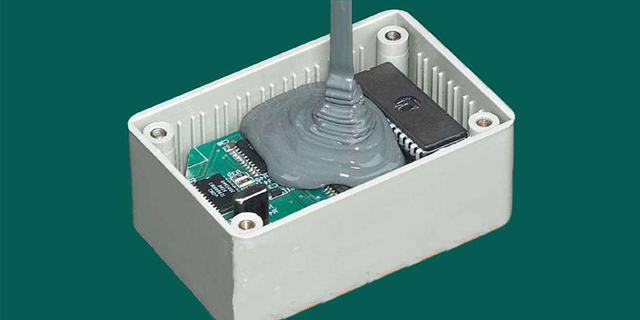
Potting glueIt is an electronic glue that can effectively protect sensitive circuits and electronic components for a long time. It can play a huge role only after curing. So what types of potting glue are there? How do we distinguish and choose the potting glue that suits our products?
The potting glue can only realize its use value after it is completely cured. After curing, it can be waterproof, moisture-proof, and dust-proof , insulation, heat conduction, confidentiality, anti-corrosion, temperature resistance, and shock resistance.
There are many types of electronic potting glues on the market at present. In terms of material type, the three most commonly used ones are epoxy resin potting glue, polyurethane potting glue, and silicone potting glue. glue. The choice of potting glue material will directly affect the operation precision and timeliness of electronic products. Among the many types of potting glue, how to choose the potting glue suitable for enterprise products has become a technical difficulty.
1 , Polyurethane potting glue
Advantages: Polyurethane potting glue has excellent low-temperature resistance, the material is slightly soft, and it has good adhesion to general potting materials. The adhesion force is between that of epoxy Between resin and silicone. It has good waterproof, moisture-proof and insulation properties.
Disadvantages: high temperature resistancepoor, anti-aging ability, earthquake resistance and ultraviolet raysComparison Weak, colloid is easy to change color.
Application scope: Generally used in potting of electronic components with low calorific value. Transformers, chokes, converters, capacitors, coils, inductors, varistors, linear motors, fixed rotors, circuit boards,LEDs, pumps, etc.
2 , epoxy resin potting Glue
Advantages: Most epoxy resin potting glues are hard, and there are also a few modified epoxy resins that are slightly softer. The biggest advantage of this material is that it has good adhesion to the material and good insulation, and the cured product has good acid and alkali resistance. Epoxy resin potting glue is generally temperature resistant100°C. The material can be used as a transparent material with good light transmittance. The price is relatively cheap.
Disadvantages: Resistance The ability to change cold and heat is weak, and cracks are prone to occur after being subjected to cold and heat shocks, causing water vapor to seep into electronic components from the cracks, and the moisture-proof ability is poor; after curing, the colloid hardness is high and brittle, and higher mechanical Stress can easily strain electronic components; once the epoxy resin potting glue is potted and solidified, it cannot be opened due to its high hardness, so the product is a “lifetime” product and cannot be replaced; transparent epoxy resin materials are generally weather-resistant It has poor durability and is prone to yellowing under light or high temperature conditions.
Application scope: Generally used for potting of non-precision electronic devices such asLEDs, transformers, regulators, industrial electronics, relays, controllers, and power modules.
3 , organic silicone potting glue
Advantages: Silicone potting glue is softer after curing, and comes in two forms: solid rubber and jelly glue, which can eliminate most mechanical stress and cause to achieve shock-absorbing protection effect. It has stable physical and chemical properties, good high and low temperature resistance, and can work for a long time in the range of -50~200℃.
Excellent weather resistance, it can still be used outdoors for more than 20 years It has a good protective effect and is not easy to yellow. It has excellent electrical properties and insulation capabilities. After potting, it can effectively improve the insulation between internal components and circuits, and improve the use stability of electronic components. It has excellent rework ability , the sealed components can be quickly and easily removed for repair and replacement.
Disadvantages: poor bonding performance.Silicone rubber has poor mechanical properties such as tensile strength and shear strength. Its physical and mechanical properties at room temperature are inferior to those of most synthetic rubbers, and general silicone rubber has oil and solvent resistance. Not good.
Scope of application: Suitable for irrigation Sealing various high-end precision/sensitive electronic devices that work in harsh environments. Such as LEDs, display screens, photovoltaic materials, diodes, semiconductor devices, automotive ballast HIV, automotive computer ECU, etc., mainly for insulation, moisture-proof, Dust-proof and shock-absorbing function.
Title of this article: Classification and Advantages and Disadvantages of Electronic Potting Adhesives
p>
Source of this article: http://www.wellgo.com.cn/newb/information_2350.shtml


